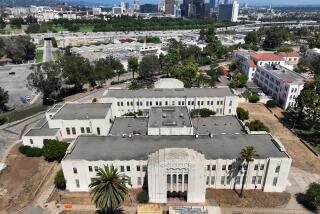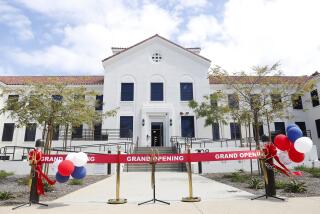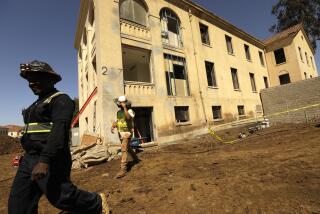Donald Johnson; Former Head of the VA
Donald E. Johnson, the chief of the Veterans Administration during the last years of the Vietnam War who resigned under stinging criticism that his agency was mistreating veterans, died of complications of cancer Tuesday in Fredericksburg, Va. He was 75.
Johnson was the former national commander of the American Legion when President Nixon appointed him to the VAâs top post in 1969. During his five-year tenure, the agency struggled under budget constraints to serve a veterans population growing by 800,000 a year at the height of the Vietnam War.
Johnson stepped down in 1974, within weeks of a tense standoff with veteransâ advocates at the Federal Building in West Los Angeles. The impasse came when Johnson initially refused to ride six floors in an elevator to meet with a group of disabled veterans who had been staging a hunger strike to protest VA policies.
When Johnson met with the group later, paraplegic Vietnam veteran Ron Kovic, whose story was made into the 1989 Oliver Stone movie âBorn on the Fourth of July,â told him that the nationâs veterans were âdrowning in a sea of VA bureaucracy.â
A World War II veteran who received a Bronze Star and a Purple Heart while serving as a sergeant in Gen. George Pattonâs 3rd Army in Europe, he had led the VA for barely a year when he had to defend the agency against serious charges of patient mistreatment and poor staffing at a VA facility in West Los Angeles.
As the last American troops were being withdrawn from Vietnam in the spring of 1974, a small group of disabled veterans staged a two-week hunger strike at the West Los Angeles office of then-U.S. Sen. Alan Cranston.
Johnson flew out from Washington to meet with the group. But when he arrived, Kovic and the two other protesters, all in wheelchairs, said they were too weak from their hunger strike to move from their spot on the 13th floor; Johnson refused to budge from the VAâs offices on the seventh floor, saying he would âonly meet on VA grounds,â and flew back to Washington.
Television coverage of the standoff spurred hundreds of angry phone calls to Cranstonâs office. The California senator, who had been one of the VAâs sharpest critics in Congress, urged Johnson to return.
He did, two days later. Kovic and the other disgruntled veterans called off their 19-day protest to meet with Johnson--in Cranstonâs office at the Federal Building in West Los Angeles.
During the tense, two-hour meeting, Johnson who was subjected to scathing criticism, was frequently interrupted and even accused of lying, but maintained his composure.
He denied Kovicâs accusations that the VA mistreated veterans.
âDo not tell me that I have no empathy for the veterans of this country. I fought in World War II. My father died in World War I. My foster father was disabled in that war. My son is a Vietnam-era disabled veteran. I am not insensitive to the needs of the veteran.â
He defended his record, noting that the Nixon administration had fought to increase veterans benefits over the past several years.
He met with the veterans again a few weeks later, saying that he was impressed by their proposals for reforming the Veterans Administration, which included annual inspections of VA hospitals and establishment of a national hotline to help veterans cut through VA red tape.
Johnson, according to Kovic, âbegan to develop a new understanding and awarenessâ of the needs of Vietnam veterans and tried to push for improvements in VA facilities.
But shortly after the meeting, Nixon announced the formation of a special management team to investigate the agencyâs operations and ordered Johnson to personally tour the VAâs 170 hospitals.
Saying that he was being driven out for political reasons, Johnson announced his resignation.
Kovic said Thursday that he was saddened by the news of Johnsonâs death. He said he ran into Johnson in Washington years after their 1974 confrontation and that they shook hands.
Johnson went on to become deputy assistant secretary of commerce and later was chief of staff to Sen. Roger W. Jepsen (R-Iowa). From 1985 until his retirement in 1993, he was executive director of the National Credit Union Administration in Washington.
Johnson is survived by his wife, Mary Jean, 10 children, 16 grandchildren and a great-grandson.
More to Read
Sign up for Essential California
The most important California stories and recommendations in your inbox every morning.
You may occasionally receive promotional content from the Los Angeles Times.











